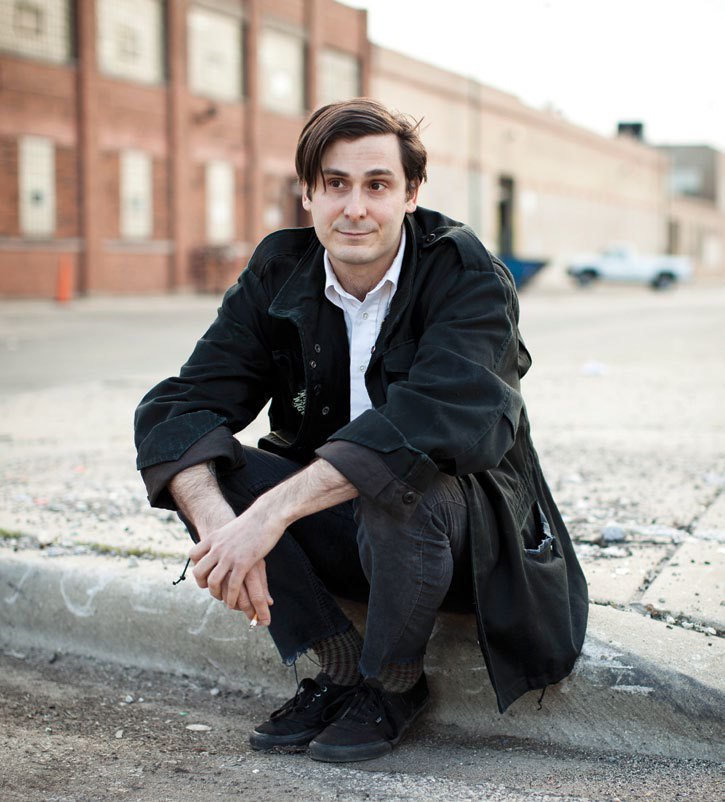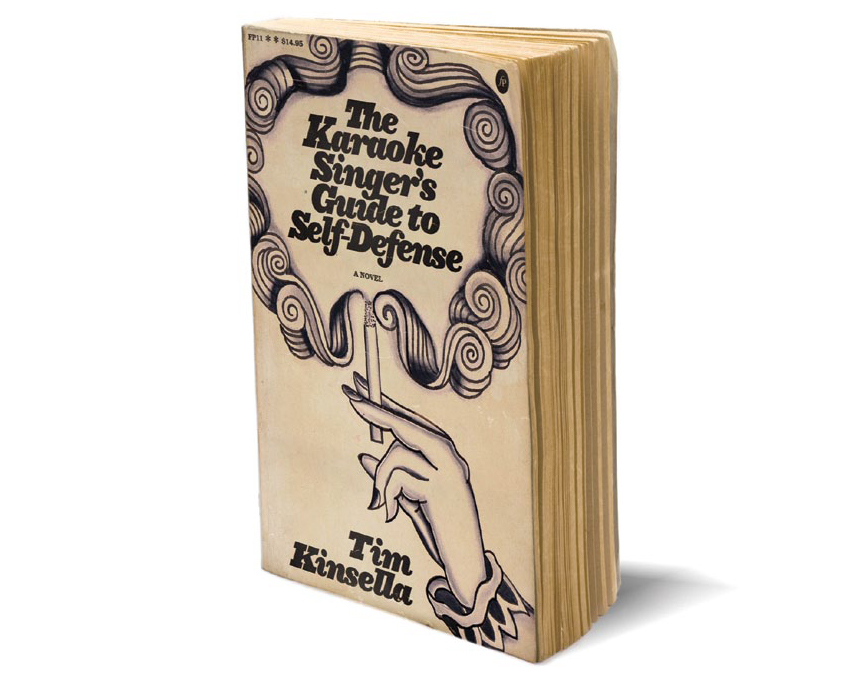Scratches a Pencil – An Interview with Writer/Musician TIM KINSELLA
Indie music pioneer, Tim Kinsella (Cap’n Jazz, Make Believe, Joan of Arc, Owls, etc) talks to us about his new novel, The Karaoke Singer’s Guide to Self Defense
 You may be familiar with Tim Kinsella through one of his many music projects. It could be from his emo-pioneering band Cap’n Jazz, his ongoing avant-rock project Joan of Arc, or any of a number of other solo efforts, collaborations, or offshoots/incarnations of those groups that he’s been involved in over the years. But, these days, Kinsella has been involving himself in more than just music and focusing his attention heavily on writing.
You may be familiar with Tim Kinsella through one of his many music projects. It could be from his emo-pioneering band Cap’n Jazz, his ongoing avant-rock project Joan of Arc, or any of a number of other solo efforts, collaborations, or offshoots/incarnations of those groups that he’s been involved in over the years. But, these days, Kinsella has been involving himself in more than just music and focusing his attention heavily on writing.
Aside from releasing 2 separate albums under the JOA moniker in 2011, his first novel, The Karaoke Singer’s Guide to Self Defense, was published last September by Featherproof Books. The 376-page work zips back and forth between a handful of people’s lives, many of which are family members in the fictional town of Stone Claw Grove, Michigan. The characters deal with addiction and aging, struggle with responsibility, and give up on brighter dreams in an attempt to settle for whatever they already have currently. Throughout it all, strippers strip, fights break out in bars, and singers cover all of the karaoke classics.
I recently had the opportunity to conduct an interview with Mr. Kinsella and to discover more about his venture into literature and his overall approach to the creation process.

I’ve been thinking a lot about how much work and time it takes to create a novel. How long did it take for you to write The Karaoke Singer’s Guide to Self Defense? Were you working on it while working on music? While touring?
It was kind of at the center of everything for me for about 2 and a half years. I participated in the Captain Jazz reunion shows, so I could have money to hunker down and revise it without having to work for a while. So, I had the first draft done by the time we started planning those. And then the last year was very carefully scheduled so that I’d spend 3 weeks in solitude working very long days on the book and then have two or three weeks away from it while we went out on tour.
People seem to have a time of day when they work better, are you more of a Morning writer, or more of a Night writer?
I’m 100% a morning writer. If I start writing by 8 or 8:30 at the latest, then I can keep it up well into the night. But if, for any reason I can’t start until 9:15, then the whole day is blown for me and I can’t write more than half an hour. I don’t know what it is, but I can’t do ANYTHING else before starting to write or I’m totally thrown off.
You’ve said that when you write a novel, you just write small scenes, and then tie them all together, which I think is noticeable in the book. The book’s narrative is also in a scrambled timeline. Did you write the sections in the order that they appear in the book, or did you do a lot of rearranging?
It was re-arranged over and over and over and over and over. It’s not a particularly dynamic plot and there’s a lot of sprawling information, so basically the entire trick to hopefully keep people turning the page was all about what information gets revealed when, like a mystery.
All of the scenes are tied to the funeral of the characters’ grandmother. Had you planned this, or did you come up with it as a means of tying together the different scenes you had written?
I don’t know. I think that was decided pretty early on in the whole thing taking shape. But I had characters emerging and a couple hundred pages written before I had anything like a shape.
Do you revise your writing a lot?
Yes. No hyperbole grand enough. Revising my writing = basically my entire life? I don’t even know where the words come from before they are being revised. I write first drafts as fast as possible, attempting to write faster than I can think. Then I throw 98% of everything away and the process becomes mostly like sculpting.
I read that you completed your MFA in Creative Writing. I’m curious, do you feel like that helped you at all in your writing? What is the process for an MFA in Creative Writing? Did you enjoy it?
It helped very much. The process is a lot of getting pointed towards good stuff to read and talking about its mechanics. I wouldn’t say I enjoyed it, but I’m not really one to enjoy things. And enjoyment hardly seems like a relevant criteria to consider one’s education in terms of.
I also read in a Youtube comment that you were doing some teaching. Do you enjoy that?
I’m an adjunct lecturer on Popular Culture for The City Colleges of Chicago. I like the students and I like talking about ideas with them – keeps me sharp. When I’m away from it, it feels meaningful at times and, when I’m in the middle of it, I’m occasionally cursing it.
The image of a karaoke machine in a strip club was such a strange one for me to try to put together in my mind, is that something you’d seen before?
No, but I’ve certainly thought a lot about the tensions between vulnerability / performance that karaoke and erotic dancing certainly have in common. The connection is a bit ham-fisted, hardly even a connection as much as degrees of the same thing.

One of my favorite scenes in the book is when one character listens to a karaoke performance of Under Pressure, and develops a richer understanding of the song’s meaning after examining the lyrics more closely. This was especially interesting, because I really like that song, but I had never paid close attention to the lyrics myself. Has this happened to you personally? Has karaoke ever put a song into a new context that changed how you felt about that song?
I don’t know. There’s this way that karaoke happens in Japan that is a lot different than how we experience it here. Here it is very rare to see anyone do it without some degree of ironic detachment. But in my experience, in Japan it seems like people get together and sing each other songs to express to each other with complete sincerity how they are feeling and what they are thinking. It’s not even coded, just a 1:1 ratio that they do completely shamelessly. That’s a little hard for us as Americans to even imagine seeing as we mostly conduct all of our interpersonal relationships in codes.
Also, I’m dying to know: In the novel one of the characters is always eating something called a “marshmallow bar.” What is a marshmallow bar? I was imagining it’s like a Rice Krispy Treat, or something.
Yeah, I guess so. There’s that whole realm of bars that are sorta candy bars and sorta granola bars. I guess they’re somewhere in that continuum.
The book’s cover has a very used-book look to it: a faded yellow-ish color, spots, and water stains, and, on the corner of the first page, it looks like someone wrote the price in pencil, as used book stores often do. I really appreciated this aesthetic, are you a used book enthusiast?
I don’t know. I’m not an enthusiast in the sense that I pay attention to buying particular editions or collecting in any sense like that. I read a lot and I make very little money, so it’s only practical. In regards to my own book being designed to look like that, that was mostly inspired by wanting to acknowledge that the themes of my book were well-tread and inherited.
What is the coolest used bookstore you’ve ever been to? Have you ever been to Powell’s in Portland?
Yeah, Powells is great, usually the first place we drive to when we pull into Portland. It’s funny that no one that works there would ever recognize me as just one more guy that walks around it once or twice a year, but every time I return I get excited because I recognize some employees and it makes me feel a little bit at home. Myopic is the neighborhood used bookstore that i’ve frequented for years.
I’ve seen some mention of a second book you’ve been working on. Can you spare some details?
I wrote the first draft years ago, before writing the Karaoke one. I’ve been revising it for the last 6 months, but am missing this week’s deadlines badly, blah. Bums me out. I’m really close to being done and sending it out to try to find a publisher. It’s much simpler – one narrator, one timeline. It takes place in combination of a couple already defined fictional worlds.
I also saw that your band Joan of Arc performed a live score to a Charlie Chaplin film. How did that go? Are you a big fan of Charlie Chaplin?
I am not particularly a fan of Chaplin, we (Joan of Arc) were just commissioned to score that specific film. Of his films I have seen, that specific one is a bit underwhelming, but we played around with speeding it up and slowing it down and I think that made it a different and hopefully engaging thing. I’m excited about what we ended up making, but the creative problem solving regarding the specifics of the situation had us considering canceling up until the day before it happened. So it was very stressful, but forced us into a new way of playing which was ultimately good.
I read that you’ve done some film directing. Are there any other non-music or non-writing projects in the works?
Joan of arc is existing these days in two parallel ways – #1 the backing band for my friend who has started writing songs for the first time in her mid-thirties and is amazing and #2 as the musical component of an experimental theater / performance art piece based on the poems of Charles Reznikoff. So these are two very different approaches that keep us busy and engaged in two very different ways that inform each other. But also, neither of these depend on us and our tastes to motivate how they should develop. So it’s a good and interesting way to be a band for now.

………………………………………………………………………………………………………………………………………………………………
The Karaoke Singer’s Guide to Self Defense is avalailable now from Featherproof books.
[Click here for free “mini-book”/excerpt.]
You can also pick up the latest Joan of Arc record, Life Like from Polyvinyl records.
Also released in 2011, is Joan of Arc’s Oh Brother; essentially a 4-song/4-sided album, showcasing Kinsella‘s varied collaborations with such artists as Zac Hill (Hella, Death Grips, Marnie Stern) and Robert A. Lowe (Lichens, Singer, 90 Day Men). Oh Brother is available through Joyful Noise.